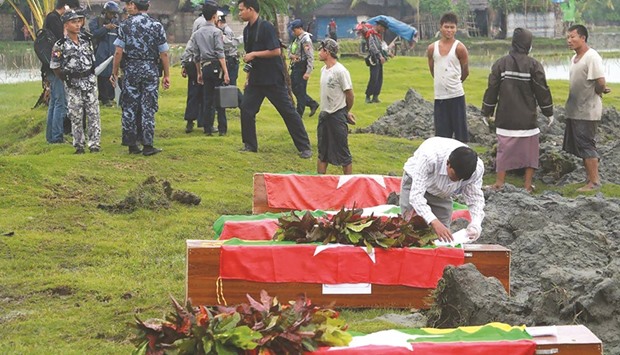Myanmar’s border guard yesterday buried nine officers killed in mysterious raids in the western state of Rakhine, as the military tightened control over a region long scarred by violence between Buddhists and Muslims.
Uniformed officers carried the wooden coffins draped with national flags through rain and thick mud before laying them to rest in a cemetery in the town of Maungdaw.
Troops have poured into the town and surrounding area close to the Bangladesh border since the three co-ordinated attacks on Sunday by what authorities have described as mobs armed with knives and homemade weapons.
Most people in the area are Muslim Rohingya, a stateless minority whom Buddhist nationalists vilify as illegal immigrants from Bangladesh — even though many have lived in Myanmar for generations.
The unrest has fuelled fears of a repeat of 2012, when more than 100 people were killed in waves of sectarian violence that drove tens of thousands of Rohingya into displacement camps.
At least four people were killed in clashes with soldiers on Monday as troops hunted for the attackers, police said.
Locals put the toll at seven and said they were unarmed residents.
“People are frustrated, people are under stress, people are hopeless here,” one Rohingya resident from Maungdaw, who asked not be named for his safety, said.
Residents have been hiding in their houses for fear of the troops patrolling the streets, he said, warning of impending food shortages.
“We cannot go from one village to another village,” he said. “Because movement is restricted and people cannot go here and there and the market is virtually closed, (food) will be a big problem for us.”
Authorities have sought to calm the situation, extending a regional curfew to between 7pm and 6am, and closing some 400 schools around the area for the next two weeks.
Myanmar’s de facto leader Aung San Suu Kyi has appealed for calm and several ministers and army top brass flew to Rakhine’s capital Sittwe yesterday to try to ease tensions in nearby displacement camps.
Rumours of killings and mass arrests around Maungdaw have spread like wildfire on social media, stoking fear, but details have proved difficult to confirm in the remote and tightly controlled area.
Yesterday residents reported sporadic gunfire in some villages to the north of Maungdaw.
One local teacher, who did not give her name, said she had been hiding in a house along with some 20 other school staff and students, too scared to come out because of the sound of gunfire.
“We haven’t eaten for two days. The situation is not so good,” she said from Ngakhura, 42 kilometres from Maungdaw. “We heard fighting here and there.
We do not dare to go out.”
Authorities have released few details about the attackers or their motives, eight of whom were killed during Sunday’s raids.
Two were captured.
Pictures sent to AFP by a photographer in the area showed one of them, bedraggled and topless, being interrogated by intelligence officers in Sittwe.

Myanmar border police prepare flag draped coffins bearing nine bodies of border guards killed in mysterious raids during a funeral ceremony at a cemetery in Maungdaw in Rakhine State on October 11, 2016.Fear gripped Myanmar’s Rakhine state on October 11 as troops hunted attackers behind recent deadly raids, which activists warned are being used as a cover to crackdown on the persecuted Rohingya minority.
